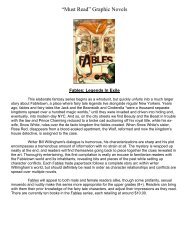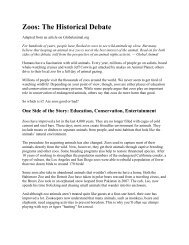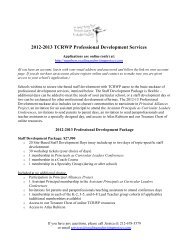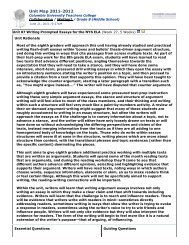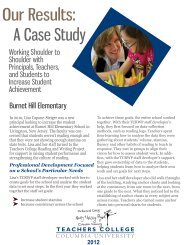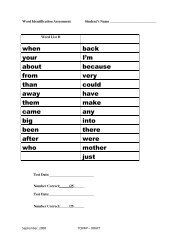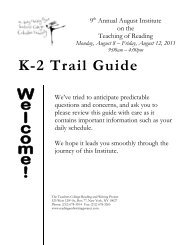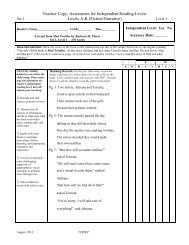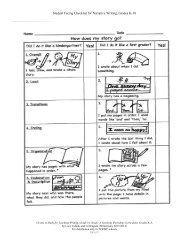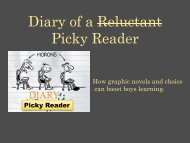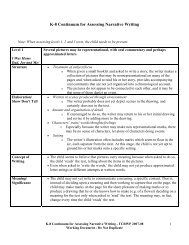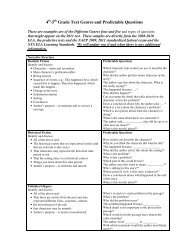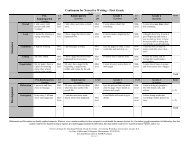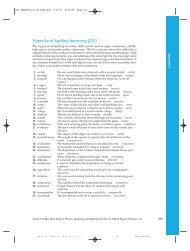<strong>Writing</strong> Curricular Calendar, Second <strong>Grade</strong>, 2<strong>01</strong>1-2<strong>01</strong>2 8Preparing for PublicationWhile focusing on content and trying above all to be sure your children are writing up a storm,you’ll want to notice your children's spelling development, their command of the conventions ofwritten language, and their stance towards writing conventionally. For now, you will see thatsome children write <strong>with</strong>out a lot of concern for spelling, even the words they almost knowcorrectly. Others obsess about spelling every word correctly, wanting your seal of approval forevery decision. You need to be sure that you differentiate your instruction, helping those lessconcerned <strong>with</strong> spelling to take that extra second to remember to write correctly in upper orlowercase, pausing to spell word wall words correctly, and inserting end punctuation as theywrite. Alternatively, you'll want to help the children who see writing as little more than anexercise in spelling and penmanship to focus much more on writing quickly, fluently, <strong>with</strong> morefocus on content. For all children, remember that rough draft writing is not supposed to beperfect, and that as children grow older and more experienced as writers, more and more writingskills will become automatic and effortless for them.At the end of the unit, children will choose their best work and they will revise more deeply andextensively, <strong>with</strong> help from you. One of the best ways for your writers to do this final revisionwork is to act as though they are teaching someone all about their topic. You might teachstudents to act as teachers when they get together <strong>with</strong> their partners to share the information intheir books. In this role of "teacher", the writer will need to be prepared to respond to questionsthat his or her partner might have around the topic being taught. This will allow the writer tonotice whether or not the information he or she has includes the most important things thatsomeone might want to know about their topic. You will want to prompt the partners to stop theteachers to say, "But I don't understand? I don't know anything about soccer, and you mentionthat you need shoes to play, but will any old shoes work? What kind of shoes do soccer playerswear? What makes shoes special and important to the sport?" This work aligns nicely <strong>with</strong> theCommon Core State Standards in second grade where students are expected to ask forclarification and further explanation as needed about the topics under discussion, they are alsorequired to ask and answer questions about what a speaker says in order to clarifycomprehension, gather additional information, or deepen understanding of a topic. This revisionprocess can last for a few days, and it can, if you’d like, involve taping flaps of paper onto thebottom or the sides of a draft, using staple removers to open books up so that one page can beremoved and a new one substituted, and so forth. Children will appreciate revision more if youmake this as hands-on as possible. <strong>The</strong> Craft of Revision book from <strong>Unit</strong>s of Study for Primary<strong>Writing</strong> can give you additional ideas for minilessons during this portion of your unit.After children revise their selected work, they will need to edit it. You will presumably alreadyhave a word wall featuring a dozen high-frequency words, and if you haven’t done so already,teach your children that writers reread, checking to be sure they use word wall words correctly.Having taught this, from now on, throughout the whole year, you will want to remind childrenthat they know how to do this and they can do it <strong>with</strong>out explicit instructions from you. Here onin, after a child writes a draft of any story (even if the writer is not on the verge of publishing it)the writer needs to reread the text, checking that he or she spelled the word wall words correctly.<strong>Unit</strong> One – <strong>Launching</strong> <strong>with</strong> <strong>Nonfiction</strong><strong>Reading</strong> and <strong>Writing</strong> Project, 2<strong>01</strong>1 ©DRAFT
<strong>Writing</strong> Curricular Calendar, Second <strong>Grade</strong>, 2<strong>01</strong>1-2<strong>01</strong>2 9You will presumably also want to remind children to write <strong>with</strong> periods and capitals that signalthe endings and beginnings of sentences. This concept is not a simple one, and although theCommon Core State Standards expect that your students will have already gained command oversuch conventions in first grade, you will want to revisit this concept, particularly if you noticethat students are not regularly attending to such things in their writing. If needed you will want toremind your writers to think of a sentence as a thought, then to write that thought down in a rush,then add the period. Moving to the next thought, you will want to begin to write it using a capitalletter. <strong>The</strong> Common Core also expects that your writers will come to you already using commasto separate single words in a series, so again you might need to revisit this convention <strong>with</strong> thosewriters who have not yet grasped this concept, perhaps through small group instruction. Eitherway you address such conventions, be sure that these are not only seen as things to check whileediting as students get ready to publish, but rather these are important aspects of writing, andfrom this day on, your children will want to do this always when they write.Be sure you don’t get overly invested in making September’s published pieces perfect. Don’tfeel that the pieces themselves need to be more focused, more detailed, and more compellingthan they are. <strong>The</strong>se are little kids at the start of the year and their work will not be perfect. Ifyou prop the work up so that it matches your high standards, then the work will not representwhat your children can do, and later you and others will not be able to look at the progression ofpublished pieces to see ways in which children are growing. This is September, and much of thisunit has been consumed <strong>with</strong> empowering your kids to remember all that they come to secondgrade knowing how to do, so relax. You may choose to have your own private authorcelebration, and then hang the finished work <strong>with</strong>in the safe confines of your own classroom ifyou need to do so in order to let the children’s own work stand.We recommend the simplest possible publishing party so that you get onto the next unit by thestart of your second month of school. Perhaps just put writers into small circles where each onehas a turn to read aloud, <strong>with</strong> the listeners chiming in after each author reads. <strong>The</strong>n gather thekids alongside the bulletin board where each writer leaves his or her work in the appropriatesquare, perhaps saying, as he or she does, “I’m proud of the way I….” You could, alternatively,be the one to say what it is that you want to celebrate in each author’s piece.<strong>Unit</strong> One – <strong>Launching</strong> <strong>with</strong> <strong>Nonfiction</strong><strong>Reading</strong> and <strong>Writing</strong> Project, 2<strong>01</strong>1 ©DRAFT



